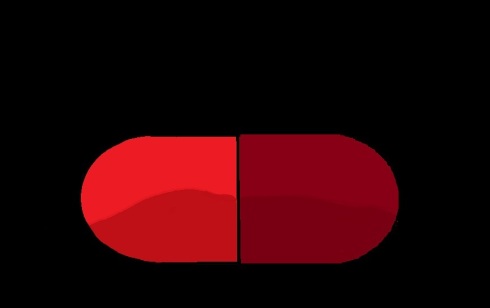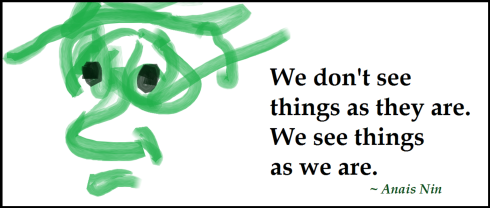Monthly Archives: April 2016
Apple vs. tree
*
*
One reader writes,
Thirty years I worked in the business my dad left me, building it up for my son. Now I want to retire and my son wants to do something else. What the hell have I been working for? He’s also engaged to a girl I don’t like. Whatever happened to family values?
My reply:
I don’t know you or your son. But I work with lots of families, and this sort of question comes up often. So I’ll answer from that context and you can decide if my answer is helpful.
I think a healthy family is one in which all members can get their needs met — not always, probably, but most of the time.
I think any family that requires a member to sacrifice himself or herself to the needs of the family is unhealthy.
I also think some families — they’re called narcissistic families — are set up unconsciously to meet the needs of the parents, even at the expense of the children. And if one comes from such a family, that arrangement seems normal. Parents simply expect kids to put aside their feelings and needs for Mom or Dad’s sake. To the parents this seems like love, or respect, or discipline, or “family values.”
Personally and professionally, I see it as something else.
So I suspect you, dad, need to decide if that’s the sort of family you came from and are trying to recreate now.
One question I like to ask parents struggling with this issue is, Do you want to raise a passenger, or a driver? If you want to raise a passenger, keep giving orders. If you want to raise a driver, at some point you have to let him or her take the wheel.
I should add that I think the parent’s job — like that of any good teacher, doctor or therapist — is to put himself out of a job. To raise a kid strong and healthy enough to separate, take care of himself, and not stay indefinitely tied to the parent.
If you stayed tied to your father until he died, you may well see it differently.
But there’s a big difference between staying connected to your parent by choice and staying connected because the parent refuses to release you.
Your children are not your children.
They are the sons and daughters of Life’s longing for itself.
They come through you but not from you,
And though they are with you, yet they belong not to you.
~ Kahlil Gibran
Red pill
A guy goes to a doctor.
“Doc, I’m in awful pain. Please help me.”
“Okay,” says the doc, “here’s some medicine. Take the blue pill in the morning, take the red pill at night.”
“I’ll take the blue one,” the guy says, “but not the red one.”
“Why not?”
“I’ve always hated red.”
This joke kept floating into my mind last week because of conversations I was having.
They were conversations with
~ an alcoholic who drinks due to loneliness, but won’t leave his isolation to attend AA;
~ a mom who craves a close relationship with her daughter, but won’t stop telling her what to do;
~ a husband who wants his wife to forgive his affair, but walks away when she tries to talk about her feelings of hurt and anger; and
~ a wife and mother exhausted from meeting everyone else’s needs, but who won’t say No to any demand made of her.
Each in considerable pain. Each avoiding some obvious step to relieve it.
Each saying I hate red.
Therapists call this behavior help-seeking/help-rejecting, and it results from a cost/benefit analysis that’s largely unconscious. On some level each of these people has decided that solving their problem would be more uncomfortable than the problem itself. They hate their pain, but they hate red more.
Pretty common, this. We all have red pills. They’re what we make New Year’s resolutions about. Things we should do but just can’t stop avoiding.
Exercise more. Watch less tv. Eat less sugar. Ask for that raise. Write that damned book.
Red-pill behavior illustrates what I call the Third Paradox*:
To get control in one place,
you have to give it up in another.
Want control of your weight? Tolerate your food cravings. Want control of your loneliness? Stop avoiding people. Want your daughter’s company? Stop bossing her. And so on.
Here’s the key:
In practice, what “give it up in another”usually means is stop avoiding some uncomfortable feeling.
Behind all controlling is the wish to control or manage feelings. Notice those examples above. The alcoholic is managing social anxiety. The mom is managing frustration with her daughter’s life choices. The husband is managing guilt over his affair.
But in backing away from those feelings they’ve backed into new problems. So solving those problems will mean learning to tolerate the feelings they avoid.
Again, we all do this. We always will. We’re all control addicts. It’s how we’re wired. No point in beating yourself up over it.
But:
If you have a problem of which you’re really really really sick and tired, you might redefine it by noticing that’s it’s really a solution as well — your way of protecting yourself from some particular emotional experience.
This sort of redefinition is the essential first step towards any solution.
So:
What red pill are you avoiding?
.
________________________________
*Click here for descriptions of the First and Second paradoxes.
The yellow brick road
Tuesday morning she had her first panic attack.
Tuesday afternoon she came into session and we had this conversation:
It was awful. I felt like I was going crazy.
I know.
If you feel like you’re crazy, does that mean you are? Or does it mean you’re not?
Depends on how you define “crazy.” Some kinds of crazy have denial built into them. Delusional people don’t know they’re delusional, for example. And addicts are famous for not realizing they’re addicted. But milder forms of crazy are different. Neurotics often know they’re neurotic.
Which kind of crazy am I?
Neurotic. Which means normal.
Neurotic is normal?
Yep. Given how we’re socialized, neurotic is the healthiest anyone ever gets.
I don’t understand.
We’re trained to hide our feelings from each other, even from ourselves. This splits us into two parts, public and private. Therapists call this splitting “neurosis.”
Neurosis caused my panic attack?
Right. That was the private part exploding.
I hated that. I don’t want to be neurotic.
Nobody does.
What can I do about it?
Work your ass off in therapy.
What kind of work?
The uncomfortable kind.
It has to be uncomfortable?
Well, neurosis comes from avoiding discomfort. So recovery means facing what you’re avoiding.
Like what?
The stuff that scares you. Coming out of hiding with other people. Telling the truth. Expressing feelings. That sort of thing.
Like giving up control.
Exactly. All the alternatives to control involve tolerating some new discomfort.
Yeah, I’d rather skip that.
Sure. Most people do. Look around you. Met many healthy people lately?
Not many. Does the work get easier?
It does. I’m not sure it ever gets easy.
But people do it because…
It’s better than the alternative.
And when does it end?
Recovery work?
Yes.
If you’re doing it right, never. You just keep becoming more yourself until you die.
Never? There’s no graduation, no Emerald City you reach?
Nope. Just the yellow brick road.
Monkey A and Monkey B
Monkey A wanders into the clearing and spots the jar under the tree. His nose wrinkles: banana. He scampers to the jar where the smell is overpowering. He sees yellow skin through the jar’s narrow neck. He reaches in, grabs and pulls, but the fruit is too big. Puzzled, he pulls harder. The banana stays stuck. He chirps in frustration, pulls with all his might. The banana stays stuck. His chirps becomes angry screeches. His little body whips around the bottle like a flag in a windstorm. He really really wants this banana. He is still wanting and pulling and screeching when the trapper’s net drops over him.
Monkey B wanders into the same clearing and smells the same banana. He reaches in, grabs, pulls. The banana stays stuck. He pulls harder. The banana stays stuck. Oh well, he shrugs. Can’t be helped. And goes his way, free.
Surrender: An interview with Bert
(If you’re new to Monkeytraps, Steve is a therapist who specializes in control issues, and Bert is his control-addicted inner monkey.
For this post, Steve interviewed Bert.)
Steve: So I’ve been writing about peace of mind and how control addiction makes it impossible, and how practicing alternatives to control make it easier to find. And I wanted to ask you about surrender.
Bert: What about surrender?
Steve: How you practice it, mainly.
Bert: Oh. Sure this is a good idea?
Steve: Why not?
Bert: People will know how lousy I am at it.
Steve: That’s okay. They know it isn’t easy.
Bert: I never use that word, by the way.
Steve: No?
Bert: No, that’s one of your writer’s words.
Steve: You don’t like it.
Bert: Not really. Sounds too much like helplessness.
Steve: That’s not what it means. It….
Bert: I know, I know. Surrender means winning, not losing. Letting go of what you can’t control represents the victory of awareness over denial, growth over habit, and faith over fear. Right?
Steve: Something like that. What word do you prefer?
Bert: Depends. Sometimes I think of surrender as detaching.
Steve: Meaning?
Bert: Taking a step back emotionally. Like when that client cursed at us in session yesterday.
Steve: And I told you to not take it personally.
Bert: Right. That it was just transference. And then other times I think of surrender as accepting.
Steve: “It is what it is.”
Bert: Yes. Though I hate that expression.
Steve: Why?
Bert: It’s like Have a nice day. Everyone says it, then go right back to being raging control freaks.
Steve: Any other words for surrender?
Bert: Let’s see. Sometimes I do it by consciously reframing a situation instead of trying to control it. Remember how mad I used to get at little old lady drivers?
Steve: Anyone driving at the speed limit, you mean.
Bert: Right. Well, now when I find myself behind one I just tell myself This is God reminding you to slow the fuck down. And I slow down, and I’m okay with it.
Steve: Very spiritual of you.
Bert: I think so. I use slogans too.
Steve: Which slogans?
Bert: Well, there’s the one you wrote on a Post-it and taped to your PC monitor:
99% of what we worry about never happens.
That got us through some rough times.
Steve: It did.
Bert: And the one you kept in the little plastic frame in your office. The one that made clients think you’re a little nuts:
Everything’s perfect.
Steve: I can’t count the times I tried to explain that.
Bert: Anyone ever buy it?
Steve: No. Easier to sell Everything happens for a reason.
But back to you. It sounds like you do a lot of surrendering, in one way or another. Why do you say you’re lousy at it?
Bert: Because of all the times I can’t.
Steve: Explain.
Bert: You know how we live. Rushing from chore to chore, worry to worry. Working down the To Do list with no end in sight. Feeling like everything is urgent. Lying in bed at night and trying to decide if you got enough stuff done to feel okay about yourself.
Then there’s the problem of people. All the times I just can’t be myself.
Steve: Can’t tell the truth, you mean?
Bert: Yes, but more than that. All the times I can’t just relax and stop worrying about how someone’s going to react to me.
But it’s more than that, too.
It’s all the times I can’t just relax. Can’t take, even, a really deep breath.
You know?
Steve: I know. Can’t relax if you can’t surrender. It’s a stubborn addiction.
Bert: Sometimes I’m sorry you told me I’m addicted.
Steve: Do you mean that?
Bert: No. No, I guess not.
Steve: What’s good about knowing?
Bert: Well, it does clarify things. When I feel angry or frustrated or crazy it’s usually because I’m trying to control something I shouldn’t. Calms me down, just seeing that.
Steve: Another surrender?
Bert: I suppose it is. And then, remembering I’m addicted gives me more choices than I used to have.
Steve: More choices?
Bert: Sure. Before I knew, I never even thought of surrender as an option. Now I know, even when I can’t do it. It’s something to work towards. Something to practice and get better at. And that gives me hope.
Steve: Hope’s good.
Bert: It is. It even lets you breathe a little bit deeper.
* * *
Yousage
*
If I’ve learned anything here
it’s that the minute I say You
to my wife, it’s Game Over.
~ Craig
Craig belonged to one of my therapy groups, where I spend lots of time encouraging members to avoid You-statements.
You know what a You-statement is. You just read one. (Two, actually.)
It’s a statement someone makes to you about you.
They’re very popular.
We use them all the time. Especially in the heat of battle. As in “You’re wrong” or “You suck.”
But whenever we use them, they tend to be destructive.
They destroy honesty, trust and connection.
In an interpersonal relationship, reliance on You statements – or Yousage, for short – creates a subtle wall between us.
One reason is that, to the listener, You feels like an intrusion or an attack. At yet at the same time it’s so common we barely notice it, even when it’s making us uncomfortable.
The biggest problem with Yousage, though, is that it’s inherently defensive.
That’s because when I talk about You I’m not talking about me. I’m directing our conversational attention away from my thoughts, my feelings, what I want. Yousage allows me to stay hidden. And hidden feels safer.
That’s why it’s so much easier to say “You jerk” than “I’m angry at you.” Or “You look terrific” instead of “I’m attracted to you.” Or “You gave an interesting talk” instead of “I had no idea what you were talking about.”
Less vulnerable. Less honest.
So. Say you decide you’d like to grow beyond Yousage. What’s the alternative?
Well, in group I teach one called feedback. It’s a form of communication that relies on I-statements — I think, I feel, I want. The most complete feedback follows the ABC format: When you (A), I feel (B), because (C). That covers all bases. But the one essential is the I-statement at its heart.
Which means it takes courage.
But the results can be startling.
When people stop saying You and start saying I in the group room, the atmosphere changes noticeably. The energy level jumps. Suddenly everyone’s there, emotionally speaking, in a way people rarely are with each other. And then real therapy can happen.
But you don’t need a group to practice this. Just a desire to improve your communication with people to whom you’d like to feel closer.
First, try noticing how often you say You.
Then, try saying it less.
Try I instead.














